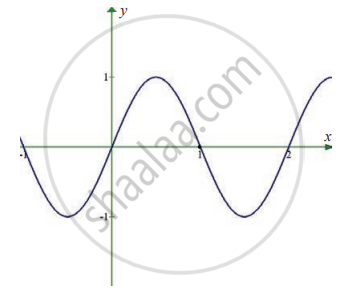Advertisements
Advertisements
Question
Evaluate the following limits:
`lim_(alpha -> 0) (sin(alpha^"n"))/(sin alpha)^"m"`
Solution
We know `lim_(x -> 0) (sin x)/x` = 1
`lim_(alpha -> 0) (sin(alpha^"n"))/(sin alpha)^"m" = lim_(alpha -> 0) (sin (alpha^"n"))/(1/alpha^"n" (alpha^"n")) xx (alpha^(1/"m") * alpha^"m")/(sin alpha)^"m"`
= `lim_(alpha -> 0) alpha^"n" * (sin(alpha^"n"))/alpha^"n" xx 1/alpha^"m" * 1/(((sinalpha)^"m")/(alpha^"m"))`
= `lim_(alpha -> 0) alpha^("n" - "m") *(sin(alpha^"n"))/alpha^"n" xx 1/((sinalpha)/alpha)^"m"`
= `(lim_(alpha -> 0) alpha^("n" - "m")) xx (lim_(alpha^"n" -> 0) (sin(alpha^"n"))/alpha^"n") xx 1/(lim_(alpha -> 0) ((sin alpha)/alpha)^"m")`
Case (i) m = n
`lim_(alpha -> 0) (sin(alpha^"n"))/(sin alpha)^"m" = (lim_(alpha -> 0) alpha^("m" - "m")) (lim_(alpha^"m" -> 0) (sin(alpha^"m"))/alpha^"m") xx 1/(lim_(alpha -> 0) ((sin alpha)/alpha)^"m")`
= `(lim_(alpha -> 0) alpha^0) xx 1 xx 1/1`
`lim_(alpha -> 0) (sin(alpha^"n"))/(sin alpha)^"m" = 1 xx 1 xx 1` = 1
Case (ii) m > n then n – m < 0
`lim_(alpha -> 0) (sin(alpha^"n"))/(sin alpha)^"m" = (lim_(alpha -> 0) alpha^("n" - "m")) (lim_(apha^"m" -> 0) (sin(alpha^"m"))/alpha^"m") xx 1/((lim_(alpha-> 0) ((sin alpha)/alpha)^"m"))`
= `lim_(alpha -> 0) 1/(alpha^("m" - "n")) xx 1 xx 1/1`
= `oo xx 1 xx 1 = oo`
Since `lim_(alpha -> 0) 1/(alpha^("m" - "n")) = lim_(alpha -> 0) (1/0)^("m" - "n") = oo`
Case (iii) m < n then n – m > 0
`lim_(alpha -> 0) (sin(alpha^"n"))/(sin alpha)^"m" = (lim_(alpha -> 0) alpha^("n" - "m")) (lim_(alpha^"m" -> 0) (sin(alpha^"m"))/(alpha^"m")) xx 1/(lim_(alpha-> 0) ((sin alpha)/alpha)^"m"`
= `(0)^("n" - "m") xx 1 xx 1`
= 0
∴ `lim_(alpha -> 0) (sin(alpha^"n"))/(sin alpha)^"m" = {{:(1, "if", "m" = "n"),(oo, "if", "m" > "n"),(0, "if", m < n):}`
APPEARS IN
RELATED QUESTIONS
Evaluate the following limit:
`lim_(x -> 2)[(x^(-3) - 2^(-3))/(x - 2)]`
Evaluate the following limit :
`lim_(x -> 7)[((root(3)(x) - root(3)(7))(root(3)(x) + root(3)(7)))/(x - 7)]`
Evaluate the following :
`lim_(x -> 1) [(x + 3x^2 + 5x^3 + ... + (2"n" - 1)x^"n" - "n"^2)/(x - 1)]`
Evaluate the following :
`lim_(x -> 0) {1/x^12 [1 - cos(x^2/2) - cos(x^4/4) + cos(x^2/2) cos(x^4/4)]}`
In exercise problems 7 – 15, use the graph to find the limits (if it exists). If the limit does not exist, explain why?
`lim_(x -> 1) sin pi x`
Verify the existence of `lim_(x -> 1) f(x)`, where `f(x) = {{:((|x - 1|)/(x - 1)",", "for" x ≠ 1),(0",", "for" x = 1):}`
Evaluate the following limits:
`lim_(sqrt(x) -> 3) (x^2 - 81)/(sqrt(x) - 3)`
Evaluate the following limits:
`lim_(x -> 3) (x^2 - 9)/(x^2(x^2 - 6x + 9))`
Evaluate the following limits:
`lim_(x-> 0) (1 - cos x)/x^2`
Evaluate the following limits:
`lim_(x -> 0) (tan 2x)/x`
Evaluate the following limits:
`lim_(x -> 0) (3^x - 1)/(sqrt(x + 1) - 1)`
Evaluate the following limits:
`lim_(x -> 0) (sqrt(2) - sqrt(1 + cosx))/(sin^2x)`
Evaluate the following limits:
`lim_(x -> 0) (sqrt(1 + sinx) - sqrt(1 - sinx))/tanx`
Choose the correct alternative:
`lim_(x -> oo) ((x^2 + 5x + 3)/(x^2 + x + 3))^x` is
Choose the correct alternative:
`lim_(x -> 0) (8^x - 4x - 2^x + 1^x)/x^2` =
Choose the correct alternative:
`lim_(x -> 0) (x"e"^x - sin x)/x` is
Choose the correct alternative:
`lim_(alpha - pi/4) (sin alpha - cos alpha)/(alpha - pi/4)` is
`lim_(x -> 0) ((2 + x)^5 - 2)/((2 + x)^3 - 2)` = ______.
`lim_(x→0^+)(int_0^(x^2)(sinsqrt("t"))"dt")/x^3` is equal to ______.
